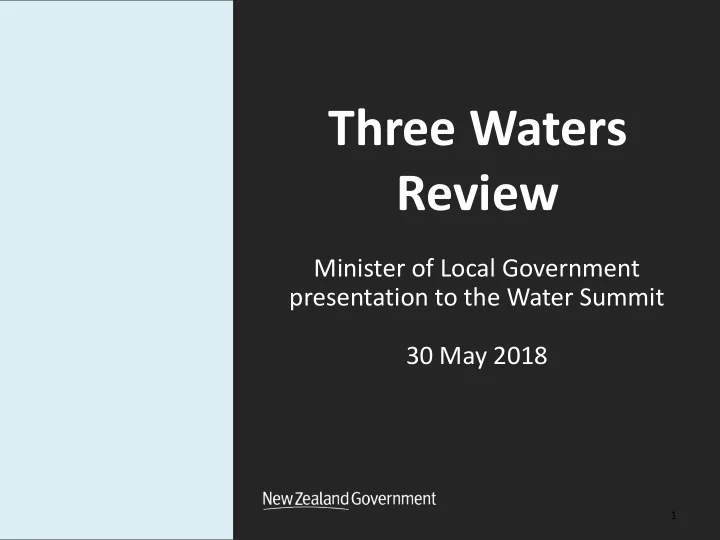

Three Waters Review Minister of Local Government presentation to the Water Summit 30 May 2018 1
The three waters system is facing some significant challenges Risks to human health and the environment in some parts of the country Affordability issues, driven by a range of funding pressures and financial challenges Capacity, capability and sustainability challenges – particularly outside large scale organisations Variable asset management and governance practices, and a lack of good asset information to support effective decision making Low levels of compliance, monitoring and enforcement of drinking water and environmental regulations Minimal central oversight and poor connections Lack of protection, transparency and accountability for consumers, compared with other infrastructure sectors and overseas water systems NOT GOVERNMENT POLICY 2
We are facing some tough questions relating to three water services and achieving priorities for the country How do we ensure communities and visitors How can we achieve our housing aspirations across the country have access to safe and and meet the increasing demand for water affordable drinking water, and swimmable infrastructure driven by urban growth? rivers and coastal waters? How can communities with small or declining How do we meet increasing community rating bases fund renewals of ageing expectations relating to drinking water infrastructure? Or cope with the pressure quality, and wastewater and stormwater placed on water services by tourists? treatment and management? How much will it cost to meet national How do we respond to big issues like directions and community aspirations for emergencies and natural hazards, climate fresh and coastal water quality – and how change, and infrastructure resilience? can communities pay for this? NOT GOVERNMENT POLICY 3
We need to start talking about how to address these challenges Continuing the status quo is not sustainable – A system-wide problem requires a system- the scale of the challenge is too great wide, collaborative solution Can we do things differently – to deliver improvements across the country, and benefit all of our communities? If we recognise and take up the opportunities for change – what might this involve? Continued public ownership of existing Larger urban populations helping smaller infrastructure assets – as the basis of any areas options for reform NOT GOVERNMENT POLICY 4
Evidence suggests we will need to address regulatory and service delivery arrangements to achieve system-wide improvements Water service delivery Capability Regulatory arrangements arrangements – for all three waters Funding & financing Public health Regulation, oversight & disclosure Environmental Economic NOT GOVERNMENT POLICY 5
The Havelock North Inquiry recommended moving to a system of aggregated, dedicated water providers If we were to consider a new model, what might the options look like? Regional, A small number of publicly-owned cross-regional, water publicly-owned providers? water providers? Or something else? NOT GOVERNMENT POLICY 6
What next? Identifying the right approach will require leadership and collaboration Ministers are meeting regularly Central government to discuss this work Large group of Ministers with Many Government priorities are a broad range of interests in dependent on a well-functioning water infrastructure are three waters system leading this work We also want to engage with iwi and Māori, Local water infrastructure experts, and consumers government Other experts and For example, a sector throughout this process interested parties reference group is being Opportunities for sector set up with LGNZ to leaders to work with work with officials on government on this options and issues NOT GOVERNMENT POLICY 7
Indicative timeframes We are still at the conceptual policy stage – lots of work needs to happen to identify, discuss, and develop options There will be ongoing engagement – including a dedicated reference group, discussions at sector events, iwi and Māori engagement, and meetings with technical experts Ministers are due to report back on high-level reform options/proposals later in 2018 In 2019 we will signal the direction of reform and work through detailed design of options – possibly followed by legislation NOT GOVERNMENT POLICY 8
Recommend
More recommend